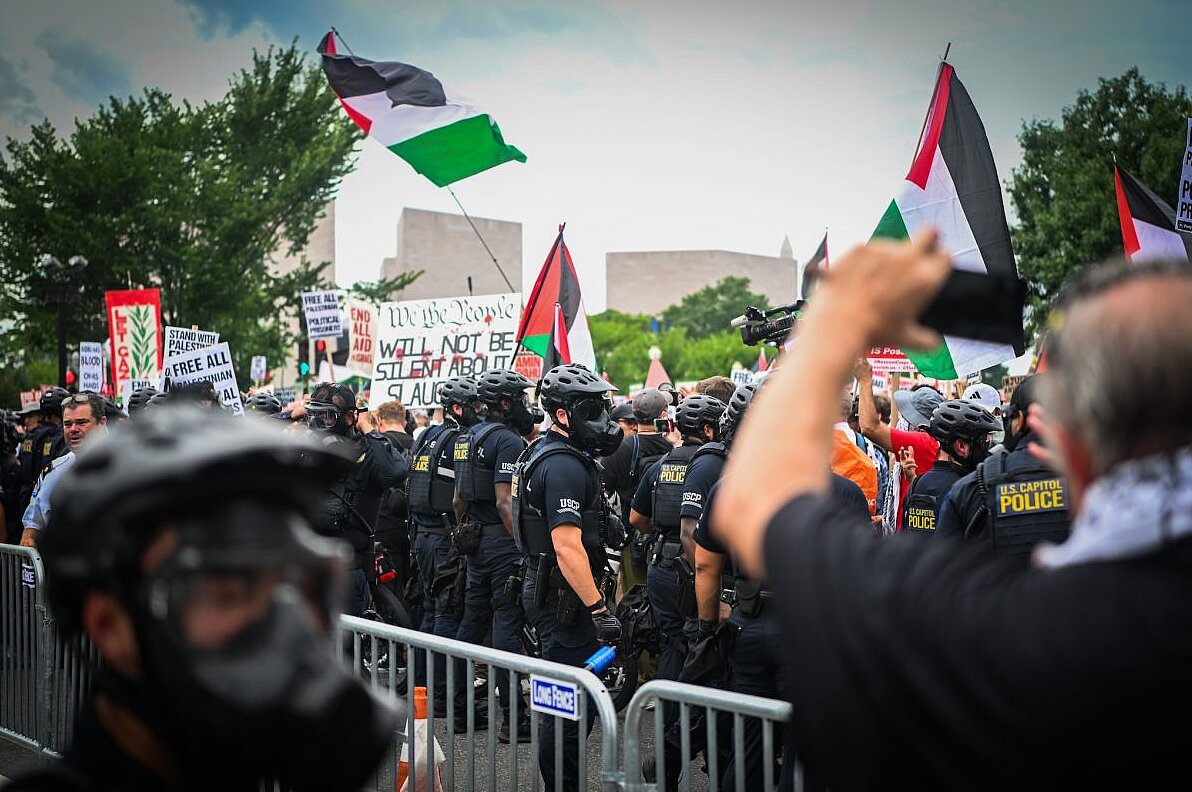Project Esther: Trump’s blueprint to crush Palestine advocacy

TEHRAN— A subtle yet pervasive campaign jeopardizing the foundation of free speech and democratic dissent has emerged in the shadow of America's political theater. Project Esther is more than just a policy initiative. It was designed by the Heritage Foundation and is now part of the Trump administration's second term.
Under the guise of combating antisemitism, it is a planned attack on the pro-Palestine movement that aims to criminalize advocacy and silence critics.
The far-right's larger Project 2025 agenda, which aims to reshape American governance under a nationalist, authoritarian vision, served as the foundation for Project Esther, which was unveiled in the tense political environment of late 2024 rather than in response to an increase in antisemitic violence.
The administration has enthusiastically embraced and operationalized this narrative since Trump's return to the White House in January 2025, and it signals a purposeful conflation of Palestinian rights activism with terrorism.
Weaponizing antisemitism to suppress dissent
Project Esther’s rhetoric characterizes the pro-Palestine movement as a security threat dressed up as activism. Activists and organizations are labelled as part of a “Hamas Support Network,” and the plan justifies the use of laws and immigration policies designed to silence critics of Israel under the guise of anti-terrorism measures.
This conflation uncomfortably undermines the distinction between legitimate political speech and terrorism, which facilitates the revocation of visas, deportation processes, and criminal investigations against people exercising First Amendment protections.
While antisemitism is a real concern that deserves attention, Project Esther weaponizes this issue to suppress dissenting voices. Its approach disproportionately targets Muslim, Arab, and left-leaning Jewish groups, reinforcing Islamophobic and anti-Arab biases. The project’s evangelical Christian authors, with minimal input from Jewish communities, further politicize antisemitism to advance a pro-Israel, nationalist agenda that undermines nuanced debate.
Legal and financial harassment as tools of repression
Project Esther focuses on a strategy called “lawfare”, which means using legal tactics to pressure, financially hurt, and break down groups supporting Palestine. Since early 2025, the Trump administration has canceled the visas of foreign students advocating for Palestine, arrested activists like Columbia grad Mahmoud Khalil, and pushed universities to get rid of any faculty or courses that support Palestinian views.
Institutions accused of harboring "antisemitism," a charge frequently thrown at pro-Palestinian demonstrations and academic initiatives, have had their federal funding withheld. Additionally, in order to undermine due process protections, the administration is advocating for increased executive authority to deport immigrants with fewer judicial checks. By severing its institutional and financial support, these strategies seek to weaken and isolate the Palestine solidarity movement.
Project Esther within Trump’s authoritarian agenda
Project Esther is a subset of the broader Project 2025 agenda, which seeks to consolidate executive power, suppress progressive movements, and impose an ultraconservative social order.
The crackdown on pro-Palestine activism exemplifies this authoritarian shift, where national security rhetoric is exploited to justify sweeping restrictions on civil liberties, free speech, and academic freedom.
Universities have become key battlegrounds with pressure to limit campus protests. Social media censorship efforts target content critical of Israel, while public officials label pro-Palestine members of Congress as terrorists. This campaign deepens political polarization and fractures communities, including within the Jewish population, where debates over Israel and free speech intensify.
Erosion of democratic principles and free speech
The arrest and deportation of activists like Mahmoud Khalil highlight the erosion of constitutional protections under Project Esther’s framework. Civil liberties advocates warn that these measures echo historical political repression, undermining the First Amendment and due process rights. The administration’s aggressive use of immigration law to silence dissent sets a dangerous precedent for all political activism.
Pro-Palestinian activism has become more resilient in the face of repression, with a variety of coalitions organizing demonstrations, sit-ins, and legal challenges. In support of free speech and human rights, progressive Jewish organizations have teamed up with Palestinian activists, highlighting the interwoven fight against authoritarianism.
Project Esther is not just a set of policies; it is a model for authoritarian rule that stifles pro-Palestine activism and wider dissent by using the war on antisemitism as a pretext. Under the pretext of national security, its incorporation into Trump's second-term agenda demonstrates a conscious attempt to increase executive authority, restrict civil liberties, and silence dissenting opinions.
The ramifications reach further than the Palestine solidarity movement and pose a threat to the foundations of American democracy. Countering Project Esther requires a united resistance, collective solidarity, legal defenses, and educating the public to protect free speech, academic freedom, and the right to political advocacy.
Given that the Trump administration is currently implementing the recommendations of Project Esther, the stakes for democracy and human rights in the United States have never been more urgent.
Leave a Comment